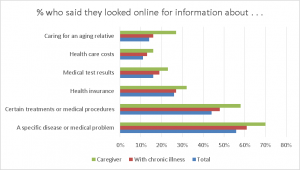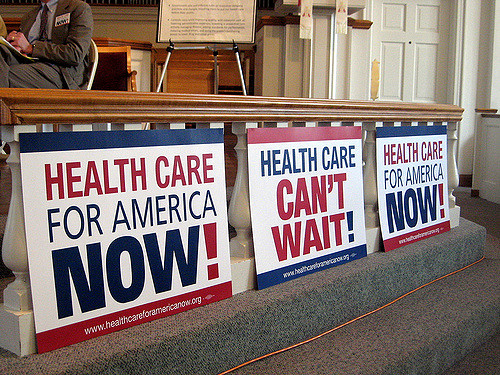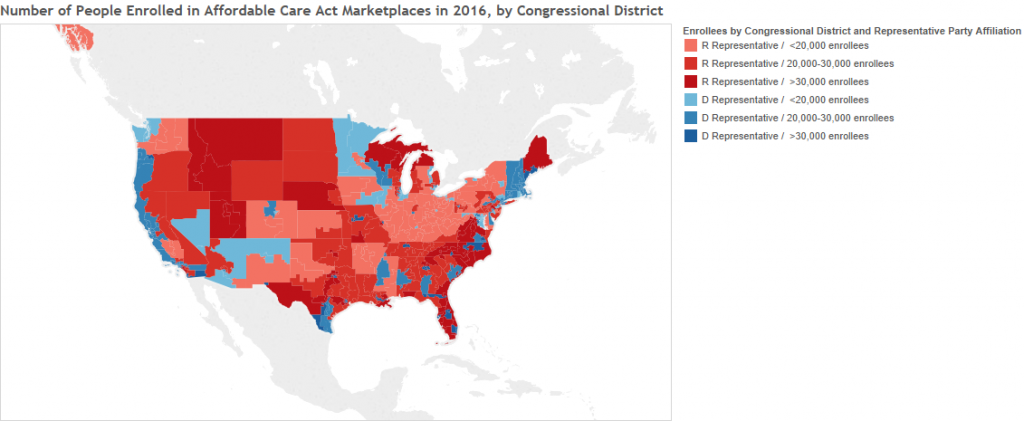The flippant title aside, according to a 2012 Pew Research survey 35% of adults in the U.S. have gone online to diagnose a medical condition. Another study found that of the 60% of adults aged 55 and older who reported using the internet in 2012, 80% looked for health information online.
It’s no surprise that using the Internet for health information has increased over time. This is true across the board even though there continue to be differences in Internet use by age, education, and income. This use of online sources is likely to continue so it’s worthwhile learning more about it.
What does health-related information use look like?
One of the nice things about Pew is that you can download their data and play with it yourself. (Those of you have followed this blog in the past know that I love to play with data). So I did.
The Pew Research September 2012 Health Tracking survey
The sample for this survey included 3,014 adults in the US. Their age ranged from 18 to 99 with an average of 53. Over half were married or living with a partner. About a quarter had never been married and the remainder were divorced, separated, or widowed. A small proportion had less than a high school education, half had a high school degree or some college, and 37% a college degree or higher. Almost three-quarters were White, 19% Black/African American, 3% Asian/Pacific Islander, 1% Native American/American Indian, and 3% identified as mixed race. Over half had less than $50,000 in family income.
The survey includes a range of questions about health, caregiving, and Internet use. I focused on the Internet use questions that seem most relevant to my interests of older adults and caregivers, although here I look at the full sample, not just older adults.
Communicating with others
- Among those with a serious health issue, about three-quarters reported getting information from a health professional, 62% got information and support from family and friends, and 24% got information from others with the same condition.
- Most people made these contacts offline. However almost one-third used both on and offline methods with family and friends or with others with the same condition.
- More of those without a chronic illness used both on and offline methods to get info from family, friends, and others with the same condition. It seems like people with more health issues are more likely to stick to traditional offline communication and information gathering.
Caregivers
- Over half of the sample reported providing unpaid care to an adult relative or friend in the past 12 months. Sixty percent of those said the Internet was helpful in providing care overall and half said that the Internet helped them cope with the stress of caregiving.
Types of information

67% of the sample said they looked online for some type of information. Looking online for information about a specific disease or medical problem or certain treatments or medical procedures were most common. Not surprisingly, a higher proportion of people who had a chronic illness or were caring for someone reported looking online for information across all categories.
It seems like Dr. Google has a pretty good practice going. That is not necessarily a bad thing as long as people pay attention to the sources they are pulling information from and evaluate the quality of that information. Of course, we all know how easy it is to find unreliable and inaccurate information online and sorting out what’s credible and what’s not can be hard. Going to sources like the Mayo Clinic and the National Institutes of Health or organizations that focus on a particular illness, such as the National Stroke Association, can be one way to insure you’re getting solid information.
Talk with your doctor about medical information you gather online.
Of the people who said they went online specifically to figure out what medical condition they might have, half said the information convinced them they needed to see a doctor. Of those 67% said they actually talked with a medical professional about what they found. That was actually more than I would have guessed, but still raises questions for me about how people are evaluating and using medical information they find online.



